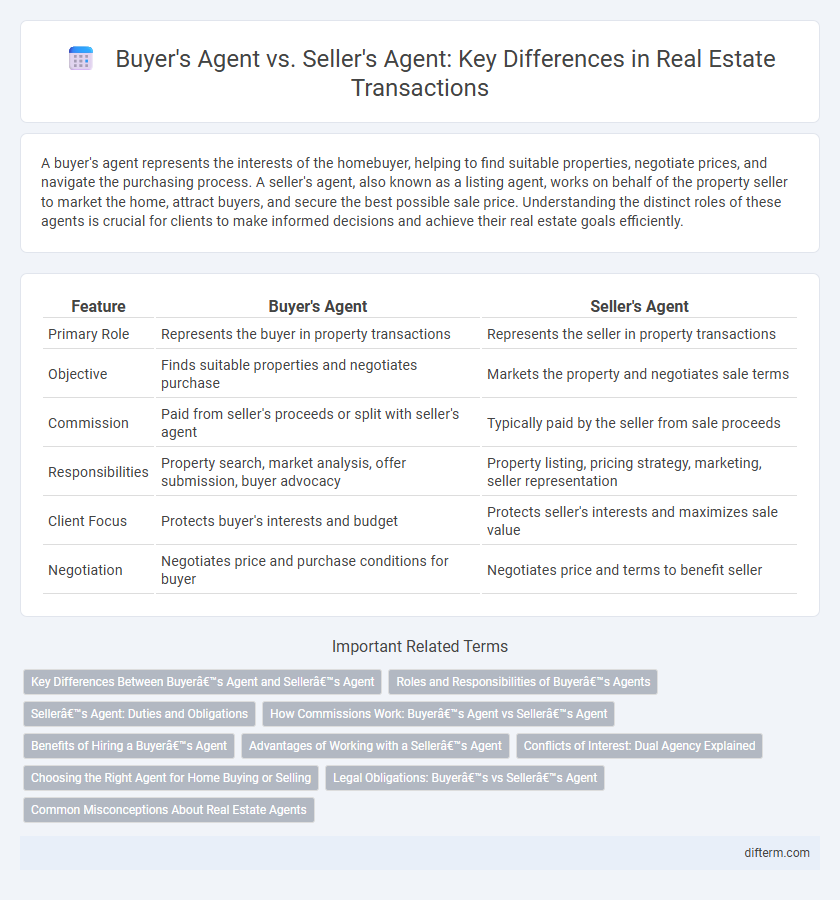A buyer's agent represents the interests of the homebuyer, helping to find suitable properties, negotiate prices, and navigate the purchasing process. A seller's agent, also known as a listing agent, works on behalf of the property seller to market the home, attract buyers, and secure the best possible sale price. Understanding the distinct roles of these agents is crucial for clients to make informed decisions and achieve their real estate goals efficiently.
Table of Comparison
| Feature | Buyer's Agent | Seller's Agent |
|---|---|---|
| Primary Role | Represents the buyer in property transactions | Represents the seller in property transactions |
| Objective | Finds suitable properties and negotiates purchase | Markets the property and negotiates sale terms |
| Commission | Paid from seller's proceeds or split with seller's agent | Typically paid by the seller from sale proceeds |
| Responsibilities | Property search, market analysis, offer submission, buyer advocacy | Property listing, pricing strategy, marketing, seller representation |
| Client Focus | Protects buyer's interests and budget | Protects seller's interests and maximizes sale value |
| Negotiation | Negotiates price and purchase conditions for buyer | Negotiates price and terms to benefit seller |
Key Differences Between Buyer’s Agent and Seller’s Agent
Buyer's agents represent the interests of homebuyers by helping them find suitable properties, negotiate prices, and navigate inspections and financing. Seller's agents focus on marketing the property, setting competitive prices, and attracting qualified buyers to secure the best sale terms for the seller. The primary difference lies in their fiduciary duties: buyer's agents advocate for purchase advantages, while seller's agents aim to maximize sale value.
Roles and Responsibilities of Buyer’s Agents
Buyer's agents primarily represent the interests of homebuyers by conducting market research, identifying suitable properties, and negotiating purchase terms to secure favorable deals. They provide expert guidance on pricing, property condition, and financing options, ensuring clients make informed decisions. Their responsibilities also include coordinating property inspections, preparing offers, and managing communication between buyers and sellers to streamline the transaction process.
Seller’s Agent: Duties and Obligations
A seller's agent represents the property owner and is responsible for marketing the home, setting a competitive listing price, and negotiating offers to maximize the seller's profit. They conduct comparative market analysis, coordinate showings, and ensure all legal disclosures and contracts comply with local real estate laws. Protecting the seller's interests while facilitating a smooth transaction is the core duty of the seller's agent.
How Commissions Work: Buyer’s Agent vs Seller’s Agent
Buyer's agents and seller's agents both typically earn commissions based on a percentage of the home's sale price, often ranging from 2.5% to 3% each. The total commission, usually about 5% to 6% of the sale price, is generally paid by the seller and split between the buyer's and seller's agents. This commission structure incentivizes both agents to facilitate a successful transaction while aligning with industry standards across real estate markets.
Benefits of Hiring a Buyer’s Agent
Hiring a buyer's agent provides access to expert market analysis, ensuring you find the best property at the right price. Buyer's agents negotiate on your behalf, securing favorable terms and protecting your interests throughout the purchasing process. Their knowledge of local neighborhoods and property values helps avoid costly mistakes and streamlines the transaction for a smooth closing.
Advantages of Working with a Seller’s Agent
Working with a seller's agent provides strategic advantages such as expert pricing guidance based on comprehensive market analysis, maximizing the property's value and appeal to potential buyers. Seller's agents have direct access to a broad network of qualified buyers and real estate professionals, increasing the likelihood of a quicker sale. Their negotiation skills focus on achieving the best possible terms and highest sale price, protecting the seller's financial interests throughout the transaction process.
Conflicts of Interest: Dual Agency Explained
Dual agency occurs when a single real estate agent represents both the buyer and the seller in a transaction, creating potential conflicts of interest. This situation can compromise the agent's ability to advocate fully for either party, as their fiduciary duties to each client may conflict. Buyers and sellers should understand the limits of dual agency and consider separate representation to ensure unbiased negotiation and protection of their interests.
Choosing the Right Agent for Home Buying or Selling
Choosing the right agent for home transactions depends on whether you are buying or selling, as buyer's agents focus on finding properties and negotiating the best price for purchasers, while seller's agents specialize in marketing homes and securing favorable offers for sellers. Understanding the distinct roles helps maximize negotiation leverage and ensures expertise tailored to your specific needs in the competitive real estate market. Aligning your choice with your transaction goals leads to better communication, smoother processes, and optimal financial outcomes.
Legal Obligations: Buyer’s vs Seller’s Agent
Buyer's agents are legally obligated to act in the best interest of the buyer, ensuring confidentiality, loyalty, and full disclosure throughout the home purchasing process. Seller's agents are required to promote the seller's interests by marketing the property effectively while providing honest information to potential buyers. Both types of agents must comply with state real estate laws, ethical standards, and fiduciary duties to prevent conflicts of interest and protect their respective clients' rights.
Common Misconceptions About Real Estate Agents
Buyer's agents exclusively represent the interests of homebuyers, while seller's agents prioritize the seller's goals during negotiations and marketing. A common misconception is that seller's agents always work against buyers, but in reality, they must disclose material facts and facilitate fair transactions. Understanding these roles helps prevent conflicts and ensures transparent communication throughout the real estate process.
Buyer's Agent vs Seller's Agent Infographic

 difterm.com
difterm.com